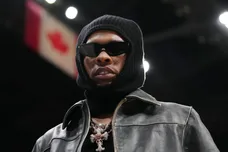Somewhere between sadistic humor and a homophobic slur, Tyler, The Creator became the face of a generation of edgy internet kids. Through the Wolf trilogy, alter-egos and characters like Wolf Haley became vessels of his personality to varying extremes in ways that felt reminiscent of Eminem and Slim Shady. He struck a visceral reaction when he emerged with the video for “Yonkers” yet his subsequent efforts proved that the shock value remained secondary to his art. Still, misogyny and homophobia unintentionally became a focal point of his brand to the blind eye who, understandably, couldn’t overlook Tyler’s twisted juvenile humor for the sake of storytelling. But, as Tyler matured, so did the characters in his work including Saint Chroma, the most forthcoming alter-ego that the Odd Future frontman adopted for his new album, Chromakopia.
Roughly 15 years after Tyler transported us to his therapist’s office on Bastard, where his teenage angst and childhood trauma became the central force of the Wolf trilogy, the L.A.-based artist invites his mother to assist in this chapter of closure. Her voice rings out through the album as a guiding light of affirmations, echoing words of uncut positivity and tough love that stuck with Tyler through his formative years in Hawthorne to global stardom. More importantly, she becomes a gateway for a deeper exploration into who Tyler became. She’s the first person who speaks on “St. Chroma,” telling him, “Don't you ever in your motherfucking life dim your light for nobody.” These words feel particularly close to home if you’ve seen Tyler’s transformation in the past decade, from employing dark humor and troll tactics as a character trait across his catalog to emerging on the frontline as one of the most ambitious artists of our time.
On Chromakopia, Saint Chroma, a persona who uses a mask to hide his paranoia, becomes a vessel to explore his own fears. There’s a clash between self-assurance and anxiety that peaks across the album. For example, songs like the electrifying Zamrock-influenced “Noid” find Tyler seemingly evokes Don Hogan Charles’ iconic image of Malcolm X peaking through his windows. “I can't even buy a home in private/ Home invasions got my brothers dyin',” he raps. “Notice every car that's drivin' by/ I think my neighbors want me dead/ I got a cannon underneath the bed/ Triple checkin' if I locked the door.” If Call Me When You Get Lost was Tyler reaping the fruits of his labor as a rapper–checking the media and his peers as a fierce competitor in the genre’s ecosystem with numbers to match–then Chromakopia explores the pitfalls of his success and the impact it’s had on his personal life.
This sense of uncertainty extends to his views on relationships, anchored by his mother’s wise words to “never tell a b*tch that you love her.” And for an artist who has managed to maintain some control over his public image, songs like “Darling I” and “Like Him” bring further context to commitment issues. The former, with a gorgeous vocal performance from Teezo Touchdown and Neptunes-like bounce, delves into Tyler’s philosophy on monogamy, and the daunting reality of what forever means. “I love this girl, though, I hit the gold mine/ I'm thinkin' new crib, I'm thinkin' two kids/ Until I get infatuated with a new bitch,” he raps. Meanwhile, “Like Him” delves deeper into the matter as he reflects on the traits he inherited from his absentee father. This record, in particular, finds him coming to terms with the complexity of his relationship with his dad while his mother takes accountability for cutting off any potential communication between them.
This level of honesty and sincerity creates the foundation for Tyler’s most forthcoming body of work in his career. Moments like “Hey Jane” are deeply intimate, where he divulges on nearly having a child and the conflicting emotions that come with it. Flexing his storytelling abilities in full, he provides a wide scope from his lens and hers. Tyler’s attention to detail, from his storytelling to impeccable production across the album, allows this journey to unfold without skip, culminating in the album’s zenith, “Take The Mask Off.” It’s here where Saint Chroma sees himself in a trifecta of characters hiding behind their truths: a gangbanger from a privileged background, a closeted pastor, and a woman of three children whose depression hides behind a facade of a picture-perfect family. Tyler’s admissions of self-doubt and selfishness are rooted in his own aspirations–a paradox that fuels his shortcomings and success.

A journey of discovering one’s self-identity ties his past and future together in ways that seep through his impeccable production and ability to harness the best out of his collaborators–a result of Pharrell’s evident influence across this project, no doubt. Doechii’s stand-out verse on “Balloons,” or ScHoolboy Q’s effortless cool on “I Thought I Was Dead” feel central to their respective songs without overshadowing Tyler. Even in the moments in between his plaintive thoughts that leap towards rambunctious beats and over-the-top flexes, the inclusion of GloRilla and Sexyy Red on “Sticky” turns the record into a quintessential banger in Tyler’s catalog, even if Lil Wayne’s verse feels subpar in comparison to their previous collaborations.
It’s the full portrait of Tyler that makes Chromakopia such a worthy listen, and as it stands, a strong contender for one of the most important hip-hop albums of the year. The evolution of Tyler, The Creator has been one of the most gratifying of any career among his generation of stars–outside of Childish Gambino, who also appears on the album. He’s always been daring in his approach to art, committed to pushing the boundaries and stretching his creativity beyond the booth. However, the honesty that he’s presented has sometimes been wedged between alter-egos. Chromakopia is an exploration of the artist behind the mask and it results in a beautifully personal body of work that digs into his new sense of liberation.









